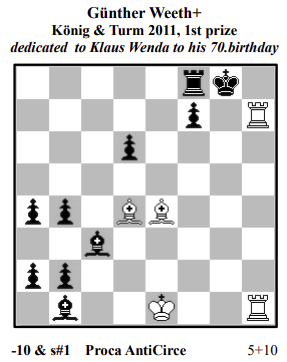 In memory of Günther Weeth
In memory of Günther Weeth
(13 August 1935 – 28 December 2020)
By Klaus Wenda (Vienna, Austria)
On 28 December 2020, Thomas Brand’s Retro-blog featured truly sad news: Günther Weeth had died after a long and severe disease.
Günther Weeth became a member of Die Schwalbe, the German association for Problem chess, in 1973 and earned his first spurs as a strong solver. Due to the friendship with retro specialist Josef Haas, his interest in retro analysis awoke. The traditional Christmas solving tourneys of the newspaper “Stuttgarter Zeitung”, widely known by an international problem solving audience, offered him the perfect arena to thrill, or sometimes exasperate, the participants with his witty and tricky riddles.
-> see more / less…
I got to know Günther in the 1990s during one of the chess meetings in the German town of Andernach. We continued to see each other there every year but only had little contact in between. This clearly changed in 2002 after Günther had read my article “Beckmesser versus Stolzing”, which was published in feenschach,144/ 2001, and dealt with reflections on the legality under the condition AntiCirce. Günther’s interest was not only aroused by the chess-related retro analytical content of my piece but also by the parallels I had drawn to the art term of Richard Wagner’s opera “Die Meistersinger von Nürnberg”.
We entered into a vivid exchange of ideas via regular mail and e-mail which, over the years, has amounted to several hundred pages. Our preferred topic, for obvious reasons, was problem chess with a focus on retro analysis, but we also discussed about classical music, in particular about Richard Wagner’s oeuvre. I always wholeheartedly enjoyed Günther’s critical reviews of symphonic concerts and opera performances, which were coined by profound expertise and a good sense of humor. His observations would have outshone the newspaper comments of many renowned cultural journalists.
The great German retro expert Wolfgang Dittmann (1933-2014) was the first one to pick up my appeal in the above-mentioned feenschach-article to give fresh life to the almost forgotten defensive retractor by connecting it with the condition AntiCirce, closely followed by Günther Weeth. Günther brought new, creative ideas to the table, which did not only concentrate on theoretical innovations but also elaborated on the riddle character, on the degree of difficulty, and on surprising effects. Some of his ideas proved to be real “gold veins” and opened new perspectives. All in all, Günther’s life work in this genre consists of approximately 250 problems.
In the course of our lively correspondence, I soon realized that we were kindred spirits whenever we worked on retro problems. The result of our almost magical connection comprises 80 joint compositions, among them numerous prize winners in notable international tournaments. This close chess co-operation led us to an even closer friendship, which also included our spouses, Gudrun and Doris.
As a former enthusiastic educator, Günther was not satisfied to merely compose and solve retro problems. Instead, he strove for explaining the secrets of fairy conditions and fairy pieces on the chess board to a broader audience in order to make the subject more transparent. A rich number of specialized articles in international chess publications such as feenschach, Die Schwalbe, StrateGems or Julia’s Fairies give evidence of his tremendous efforts in this respect. Günther was famous for his entertaining presentations at Andernach- and Schwalbe-meetings, which showed him as an eloquent and amusing protagonist of the AntiCirce defensive retractor.
The installation of the Magic Square in defensive retractors with the condition AntiCirce (see Weeth, “Die Schwalbe”, 240/2009, pp. 305-306) is a solid example of his intellectual joy to experiment. On the occasion of Günther Weeth’s 75th birthday in 2010, feenschach announced its 63rd Theme Tourney, where problems dealing with the Magic Square had to be composed. The rules of Günther´s creation “Magic Wander Unit” were explained by him and Hans Gruber in a complex “Convention” published in feenschach, 213/2015, pp.181-182.
Since the summer of 2020, Günther intensively worked on a new project, the defensive retractor with the conditions AntiCirce+Circe. He presented the results of his analysis, decorated with some quite original problems, in an article in Die Schwalbe, 306-2/2020, pp. 821-824. Günther still translated the piece into English before his passing. It is expected to be published in Julia’s Fairies soon.
My sincere sympathies go to Günther’s family, especially to his wife Gudrun, who always appreciated his time-consuming hobby, problem chess. An eminent problemist left Caissa’s World – and I have lost a good friend.
3 problems by Günther Weeth: G.W. – König & Turm 2011 | G.W. – StrateGems 2016 | K.W. & G.W. – Die Schwalbe 287/2017
Vienna, January 2021
Klaus Wenda
Problems by Günther Weeth published on JF 2015-2019: No. 885 | 1223 | 1261 | 1322 | 1357 | 1440
 In memory of Günther Weeth
In memory of Günther Weeth


Mr. Günther Weeth was my English teacher at the Otto Hahn Gymnasium in Böblingen. Fifty years have passed since then. My English wasn’t good, but I played football better than he did. He was always kind to me, and for years I racked my brains trying to solve his chess compositions. Not many of my teachers are as memorable as him, partly because he had an incredible sense of humor.